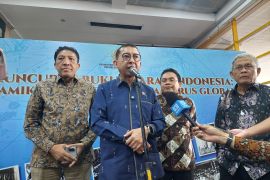The execution of the Indonesian domestic helper sparked an uproar at home and calls on the government to apologize to the people and to protect some 22 other Indonesian migrant workers who are now still on death row in Saudi Arabia.
"President Susilo Bambang Yudhoyono, Foreign Minister Marty Natalegawa, Manpower Minister Muhaimin Iskandar and Head of the National Agency for Placement and Protection of Indonesian Workers Overseas (BPN2TKI) Jumhur Hidayat, must apologize to the people of Indonesia because they failed to protect Indonesian citizens working overseas," Iberamsjah, professor of political and social sciences of the University of Indonesia (UI), said in a discussion here on Monday.
Former chairman of the Indonesian largest Muslim organization Nahdatul Ulama (NU), Hasyim Muzadi urged President Yudhoyono to take the necessary steps and to be serious in preventing the repetition of execution of Indonesian citizens in foreign countries. He made the remarks in response to the beheading of Ruyati over the weekend in Saudi Arabia.
Ruyati who was sent to Saudi Arabia by manpower supplier firm PT Dasa Graha Utama, was found guilty of killing Saudi Khairiya bint Hamid Mijlid on January 12, 2010 by striking her repeatedly on the head with a meat chopper and stabbing her in the neck.
Chairman of the Indonesian Community I Forum (FKI-1), M Julian Manurung urged the foreign minister, the manpower minister and the BPN2TKI head to account for the execution of the Indonesian workers for their negligence in carrying out their functions.
"How many more of the nation`s sons or daughters will undergo executions without the knowledge of the government," Julian Manurung said. He said that the Indonesian government was paying little attention to the fate of Indonesian migrant workers abroad.
After the execution of Ruyati, now there are at least 22 Indonesian migrant workers on death row, one of whom is Darsem. Darsem could be freed from the death penalty if the she pays two million Riyals or about Rp4.7 billion.
"If Darsem is freed from capital punishment after the fine is paid, the problem is not yet solved because it is not only Darsem who is waiting to be executed, there are tens of others on death row. This is a warning to President Yudhoyono. We should thank God if he is able to solve these problems," Hasyim said.
If the president was not able to find a way out, the issue would pose a big problem for him and his government ahead. It could become worse because, after all, it concerned legal justice, political and economic issues.
Therefore, he said, the president should carry out a top level diplomacy to free migrant workers from the threat of capital punishment. "He will be considered irresponsible if he continues to avoid problems while on the other hand the public knows that he was very irritated and paid high attention to an SMS text message which was critical of him, although the SMS was anonymous," he said.
He said when Abdurrahman Wahid was president, he once called the Saudi King asking for clemency for Siti Zaenab, a domestic helper who was to be executed. As a result, the execution was finally canceled. "Siti Zaenab was saved from the death penalty thanks to the high level diplomacy," said Hasyim.
Therefore, according to Iberamsjah, the government must be all out in defending Indonesian workers who got capital punishment. "So far, President Yudhoyono has always played a `good game`. I don`t know who he had assigned to handle the matter, the ambassador or the consul general. The Arab people are very feudalistic, if their King says A, it must be A. So we cannot rely on merely a diplomatic note, it is useless," Iberamsyah said.
In the meantime, Middle East observer Yon Machmudi of the University of Indonesia said the beheading of the Indonesian migrant worker showed Saudi Arabi`s attitude which belittled Indonesia.
"This could be seen in the legal process of and the execution of the Indonesian convict where the Saudi government did not notify the Indonesian government over the matter," Machmudi said in press statement to ANTARA.
He said that the weak bargaining position of Indonesia against Saudi Arabia could be seen from various cases befalling Indonesian citizens in Saudi Arabia. The settlement of various cases such as torture, rape and murder of Indonesian citizens has always disadvantaged them.
"It is very often that Indonesians were charged with murder which actually as a result of rape cases by Saudis. But because of the absence of legal protection the cases ended with death penalties," Machmudi said. This is ironical because the Indonesians who were charged with murder were forced to commit the crime only to defend themselves.
He said that the Saudi government was very harsh in carrying out capital punishment for Indonesian citizens but not for murder cases committed by Saudis, which often they committed with torture and other inhumane treatment.
Machmudi cited as example the case of Darsem binti Tawar who could escape the death penalty if she paid two million Riyals (Rp4.6 billion) while a Saudi who committed a murder with torture on an Indonesian could escape the death sentence with a fine of only 185,000 Riyals (Rp450 million).
This means, he said, the Saudi government considered that the value one Saudi sole was equal to ten Indonesian soles, he said.
Therefore, Hasyim, who is also secretary general of the International Conference of Islamic Scholars (ICIS), expressed his hope that the government would review its policy of sending domestic helpers to Saudi Arabia.
He said that as the only domestic helper exporter to Saudi Arabia, Indonesia had always been ridiculed by poor countries as a country with no dignity with regard to domestic helper cases.
There are about 1.5 million Indonesian migrant workers in Saudi Arabia. An estimate has put the number of Indonesian problematic workers in Saudi Arabia at 50,000. The government has planned to help some 25,000 return home this year.
Until last March, 2,073 of the planned 25,000 have been facilitated to return home, and early in May, the government returned again 2,349 others. ***
Reporter: Andi Abdussalam
Copyright © ANTARA 2011











